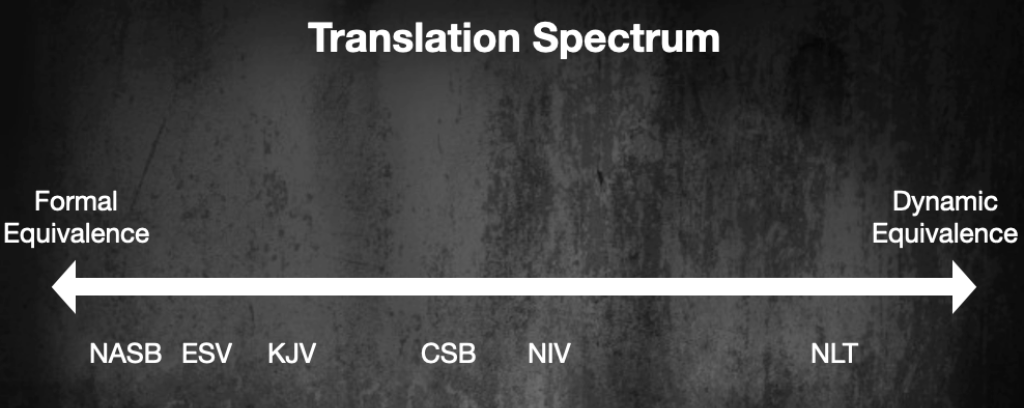How We Got Our Bible: Modern Translations
This article will consider the differences among the modern translations.
Translation Theory
Have you ever wondered why Bible translations differ from one another? For example, some say “brothers” while others say “brothers and sisters.” Or some say “he knew her” while others say “he had sexual relations with her.” Why the differences? Two factors explain why.
The first factor is textual. Which Greek or Hebrew text is the base text for the English translation? The TR or the NA? And which textual variant most likely represents the original? Because I already dealt with textual criticism in article six of this series, I’ll simply refer you to that article.
The second factor which explains the differences among the translations is linguistic. Bible translators must ask themselves how they can best transfer the words and ideas from the original languages into English. Should they seek a translation that is more literal word-for-word? Or should they seek a translation that irons out the meaning in a more readable way? Or should they land somewhere in between?
Translations ultimately land somewhere on the spectrum between a more literal word-for-word translation (formal equivalence) and a meaning-for-meaning translation (dynamic equivalence). Formal equivalent translations will give a more literal rendering “Adam knew Eve” (ESV), while dynamic equivalent translations will give the meaning “Adam had sexual relations with his wife, Eve” (NLT). If you’re wondering where your favorite translation lands on the spectrum, I’ve listed some of the more popular translations below:

Linguistic Issues
Currency, Weights, and Measures
Translating currency, weights, and measures is a difficult task. Consider the Parable of the Unforgiving Servant. Matthew 18:24 reads:
“One was brought to him who owed him ten thousand talents” (ESV).
“A man who owed him ten thousand bags of gold was brought to him” (NIV).
“One of his debtors was brought in who owed him millions of dollars” (NLT).
The difficulty in translating “talents” (which is the more literal translation) is immediately obvious. The word talent means something completely different in our modern vernacular. The ESV decided to stick with the literal rendering, but at what expense? (no pun intended) Even if someone were to realize talent refers to a currency, they still have no idea how much a talent was worth.
The NIV decided that a literal rendering would not be helpful. But they also decided that giving a literal amount was impossible. Therefore, they went with “ten thousand bags of gold.” How much is ten thousand bags of gold worth? A whole lot! Though no specific amount is given.
The NLT went in an even different direction. While they are similar to the NIV in that they don’t list a specific amount, they decided to translate the currency into American dollars. This decision, however, suggests that they are thinking primarily of an American audience. Why not the British pound?
Another example is Isaiah 5:10.
“For ten acres of vineyard shall yield but one bath, and a homer of seed shall yield but an ephah” (ESV).
“A ten acre vineyard will produce only a bath of wine; a homer of seed will yield only an ephah of grain
(NIV).“Ten acres of vineyard will not produce even six gallons of wine. Ten baskets of seed will yield only one basket of grain” (NLT).
You can see that both the ESV and the NIV translated the measures in a literal way. In doing so, they tell us exactly what the Hebrew text says. But who knows what a “homer of seed” or an “ephah” is? The NLT, again, attempts to give the meaning by using understandable terms such as “gallons” and “baskets.”
Euphemisms
Every culture has its own euphemisms. “That one bit the dust” or “He’s not the sharpest tool in the shed” would confuse anyone trying to learn English for the first time. If someone were to translate those phrases into another language, should they translate them word-for-word like above, or give the meaning of the phrases?
We find scores of Hebrews and Greek euphemisms in the Bible. Consider Rachel’s words to her father Laban in Genesis 31:35.
“Let it not displease my lord that I cannot rise up before thee; for the custom of women is upon me” (KJV).
“Let not my lord be angry that I cannot rise before you, for the manner of women is upon me” (NASB).
“Don’t be angry, my lord, that I cannot stand up in your presence; I’m having my period” (NIV).
The KJV and the NASB give a more literal rendering of the Hebrew text while the NIV gives the meaning of the euphemism.
Another word, though technically not a euphemism, that Bible translators wrestle over is the word “flesh.” Consider Paul’s words in Romans 7:18.
“For I know that nothing good dwells in me, that is, in my flesh” (ESV).
“For I know that good itself does not dwell in me, that is, in my sinful nature” (NIV).
“For I know that nothing good lives in me, that is, in my flesh” (CSB).
I grew up in church, so I am familiar with the term “flesh.” That said, someone picking up a Bible for the first time might be confused by this term. In Romans 7:18, both the ESV and the CSB give the literal rendering of the Greek, while the NIV gives Paul’s meaning.
Grammar and Syntax
Every language has a unique structure. Greek and Hebrew have different structures from English. That said, a literal wooden word-for-word translation would be so unreadable and unhelpful, that even the most formal equivalent translations like the NASB smooth out the sentences into English.
One grammatical issue that Bible translators wrestle with revolves around the genitive case. The genitive is often thought of as the “possessive case” in cases such as “my dog” or “Billy’s house.” Yet, many times, the genitive does not convey possession but functions more like an adjective. The formal translations, however, still tend to translate these genitives as possessives by giving the literal rendering “of.” Speaking of God the Son, Hebrews 1:3 states:
“he upholds the universe by the word of his power” (ESV).
“upholds all things by the word of His power” (NASB).
“sustaining all things by his powerful word” (NIV).
Both the ESV and the NASB give the wooden genitive “of” reading while the NIV smooths out the meaning and shows that power is not a possessive but an adjective modifying “word.”
Gender Pronouns
The final issue we will consider deals with gender inclusion. Hebrew and Greek both used masculine pronouns to describe humans in general. The Greek word anthropos functions this way. And to an extent, we still do this today when we say things like “mankind.” That said, English translations wrestle through translating the masculine pronouns so as to not exclude the female gender. Some translations stay with the literal rendering, while others attempt to give the meaning. Consider Psalm 1:1.
“Blessed is the man” (ESV).
“Blessed is the man” (NASB).
“Blessed is the one” (NIV).
“Oh, the joys of those” (NLT).
“How happy is the one” (CSB).
The more literal reading is “man.” That said, the meaning is gender inclusive.
Different Translations
So, which Bible translation should you use? Well, it all depends on your goal. If you’re looking to give a Bible to a young child, you may consider a Bible on the dynamic equivalence end of the spectrum. If you’re wanting a Bible to read consistently throughout the year, I’d recommend multiple Bibles. The NIV and CSB are nice options as they strike a nice balance between formal and dynamic equivalencies. That said, it’s also nice to have a Bible that gives you a more literal rendering so that you can get a better idea of what the original languages say.
Personally, I consult at least three Bibles when I’m studying a text. I look at both a formal and dynamic translation, as well as one somewhere in-between.
Recommended resources related to the topic:
Counter Culture Christian: Is There Truth in Religion? (DVD) by Frank Turek
Defending the Faith on Campus by Frank Turek (DVD Set, mp4 Download set, and Complete Package)
_____________________________________________________________________________________________________________________________________________________
Ryan Leasure holds a Master of Arts from Furman University and a Masters of Divinity from the Southern Baptist Theological Seminary. Currently, he’s a Doctor of Ministry candidate at the Southern Baptist Theological Seminary. He also serves as a pastor at Grace Bible Church in Moore, SC.
Original blog: https://bit.ly/3S36ZGY










